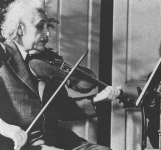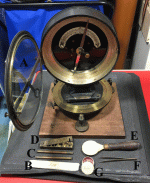As part of your audience I think you're doing a great job, even if I don't believe in the Big Bang, dark matter or dark energy 🙂. The theory is simply too weak, due to the 98%(?) (IMVVHO). (And the concept seem too far fetched from a non-cosmologist POV ).Granted, but why would you deny me my "audience"? After all, competition is what drives scientific endeavor.
I participate in this thread because I am interested in understanding, interpreting and sharing scientific ideas and the mysteries of the universe.
If I come across as being negative, superior or dismissive of the submissions of others, then I promise to work on my social skills.
Anyway, I tought I share this documentary again, I got no response last time I tried posting it.
The Universe: Cosmology Quest, directed by Randall Myers 2004
https://www.imdb.com/title/tt0851217/
Part 1 featuring:
Geoffrey Burbidge, Halton Arp, Sir Fred Hoyle, Jack Sulentic, John Dobson, Margaret Burbidge, Martin Lopez-Corredoira, Kary B. Mullis
Part 2 featuring:
Anthony Peratt, Kristoffer Rypdal, Eric J. Lerner, Truls Lynne Hansn, Jayant V. Narlikar, Andre Koch Assis, Jean-Claude Pecker
I thought it could be interesting for some of you to hear these quite intelligent and well informed people present a non-Big Bang position. Not only for the theoretical, but also for their experiences with the scientific community. And maybe things has has progressed since 2004?
Enjoy!
Regards,
Dagfinn
Thanks for your kind words, Dagfinn.
I shall put those videos on my 'to view' list and hope I will be able to provide a response.
I shall put those videos on my 'to view' list and hope I will be able to provide a response.
There's Two Hours of my Life I will never get back! 😊
So in Part 1 what we have is 3 Galaxies presenting anomalous results: NGC 7603, NGC 4319 with variable redshifts (perhaps explained by their proximity being an optical illusion or coincidence), and M82 doing something Quasar-like.
Vera Rubin was presented as someone who's ideas were ridiculed and suppressed, but in fact she examined Galaxies and postulated Dark Matter to explain why they don't fly apart.
In Part 2, Plasma interactions are examined. It is a reasonable idea that the majority of matter is in the highly interacting Plasma State. Things going on that we have little understanding of.
Jets of radio waves and perhaps Plasma going North and South from the centre of Galaxies. Auroras familiar to Norwegians.
Without taking a strong view on the "Big Bang Theory" it is certainly a contender. Perhaps it is wrong, but a "Steady State Universe" poses just as many problems to my small brain. When did it start, where did it come from.
I certainly like the idea of Plasma interactions being more significant than we previously thought. Maybe a Hidden Force.
Anyway, Today's Mission is to continue investigations into the Higgs Boson. After that it is Roger Penrose.

The Portsmouth students nab all the good books at the beginning of the Academic year. Only other serious contender was Brian Greene's "The Fabric of the Cosmos".
Which I skimmed, but seemed a bit heavy on analogy. String Theory, one suspects...🙄
So in Part 1 what we have is 3 Galaxies presenting anomalous results: NGC 7603, NGC 4319 with variable redshifts (perhaps explained by their proximity being an optical illusion or coincidence), and M82 doing something Quasar-like.
Vera Rubin was presented as someone who's ideas were ridiculed and suppressed, but in fact she examined Galaxies and postulated Dark Matter to explain why they don't fly apart.
In Part 2, Plasma interactions are examined. It is a reasonable idea that the majority of matter is in the highly interacting Plasma State. Things going on that we have little understanding of.
Jets of radio waves and perhaps Plasma going North and South from the centre of Galaxies. Auroras familiar to Norwegians.
Without taking a strong view on the "Big Bang Theory" it is certainly a contender. Perhaps it is wrong, but a "Steady State Universe" poses just as many problems to my small brain. When did it start, where did it come from.
I certainly like the idea of Plasma interactions being more significant than we previously thought. Maybe a Hidden Force.
Anyway, Today's Mission is to continue investigations into the Higgs Boson. After that it is Roger Penrose.
The Portsmouth students nab all the good books at the beginning of the Academic year. Only other serious contender was Brian Greene's "The Fabric of the Cosmos".
Which I skimmed, but seemed a bit heavy on analogy. String Theory, one suspects...🙄
Thanks for your response. There's more, of course https://en.wikipedia.org/wiki/Atlas_of_Peculiar_Galaxies .There's Two Hours of my Life I will never get back! 😊
So in Part 1 what we have is 3 Galaxies presenting anomalous results: NGC 7603, NGC 4319 with variable redshifts (perhaps explained by their proximity being an optical illusion or coincidence), and M82 doing something Quasar-like.
You can have the two hours back when the Universe/time starts going backwards 😉. Didn't Hawkings suggest something like that? Or was he joking? 😀
Here are two picures of the first research station at Bossekop, Alta, Norway, 1882. Part of the First International Polar Year 1882-83. It developed over time, and the first images of auroa borealis were shot here later. This is where Birkeland worked for a while. Photos by Carl Krafft. See the scientist posing with their instruments? https://peskatun.no/about/northern-lights-history-in-alta/
Last edited:
See the scientist posing with their instruments?
Thus starting a tradition that would be continued by future scientists! 😊
Attachments
Hehe, I believe he was a funny guy too 🙂. Here's map of the area, but also a list of observation "instruments". The "Franzozen" mentioned (A, B, C) refers to the "La Recherche" expedition 1838-40, who brought back images of the northern lights at Bossekop.

In 1839 photography didn't exist, but the "La Recherche" artistic images were impressive enough for the German expedition to put the first Polarstation there 30 years later.

Maybe plasma is a significant part of the Universe? 🤔
In 1839 photography didn't exist, but the "La Recherche" artistic images were impressive enough for the German expedition to put the first Polarstation there 30 years later.
Maybe plasma is a significant part of the Universe? 🤔
...a list of observation "instruments".
Attached is an important British expeditionary science instrument - designed in 1839.
The glass cover (A) can be closed in bad weather. Clockwise from the bottom left, is a packet of silk (B), two deflectors (C), a brass tin containing various weights (D), a wooden-handled ivory disc (E), tweezers (F) for attaching weights, and a pot of ‘hooks’ (G) to suspend the weights from the silk.
Kudos to anyone who can name the instrument and/or state its purpose.
Attachments
I must be Frank, Galu. I wonder if you are serious about unravelling the Mysteries of the Universe. 🙄
Consider my situation, as an ordinary autistic person.
There I was, yesterday, being fully aware of the Hubble Space Telescope's latest Discovery:
https://www.bbc.co.uk/news/science-environment-60931100
An Old Star only glimpsed due to Gravitational Lensing.
Anyway, even (Sports) Radio 5 Live Drivetime felt a need to discuss the matter. Tony Livesey ( Who wouldn't know a Black Hole from a Hole in the Ground...) was interviewing a Lass called Becky about this.
He said, and I quote, "So Becky, this thing is at the very edge of life?"
Becky patiently explained it was in fact only about a Billion Years after the (alleged) Big Bang.
On further investigation I have established that Becky is, in fact, our own Forum favourite Astrophysicist, Doctor Becky Smethurst.

After her Youtube efforts, she has evidently moved on to Radio. Next is Television. Could she be the next Patrick Moore?
Well, only if she can accompany Einstein's Violin on Piano with Saint-Saens "Swan" IMO.
https://www.theregister.com/2012/12/10/sir_patrick_moore_obituary/
Consider my situation, as an ordinary autistic person.
There I was, yesterday, being fully aware of the Hubble Space Telescope's latest Discovery:
https://www.bbc.co.uk/news/science-environment-60931100
An Old Star only glimpsed due to Gravitational Lensing.
Anyway, even (Sports) Radio 5 Live Drivetime felt a need to discuss the matter. Tony Livesey ( Who wouldn't know a Black Hole from a Hole in the Ground...) was interviewing a Lass called Becky about this.
He said, and I quote, "So Becky, this thing is at the very edge of life?"
Becky patiently explained it was in fact only about a Billion Years after the (alleged) Big Bang.
On further investigation I have established that Becky is, in fact, our own Forum favourite Astrophysicist, Doctor Becky Smethurst.
After her Youtube efforts, she has evidently moved on to Radio. Next is Television. Could she be the next Patrick Moore?
Well, only if she can accompany Einstein's Violin on Piano with Saint-Saens "Swan" IMO.
https://www.theregister.com/2012/12/10/sir_patrick_moore_obituary/
What's her moniker?
Pfft, if you've seen one star you've seen em all. What's so exciting? Way more fun looking at Becky, no?
Pfft, if you've seen one star you've seen em all. What's so exciting? Way more fun looking at Becky, no?
Great stuff, Steve - or should I say, Frank? 😊
A single, incredibly remote star only made visible by a cosmic magnifying glass!
A fascinating find - if the astronomers have interpreted the data correctly.
A single, incredibly remote star only made visible by a cosmic magnifying glass!
A fascinating find - if the astronomers have interpreted the data correctly.
- Status
- Not open for further replies.
- Home
- Member Areas
- The Lounge
- What is the Universe expanding into..

